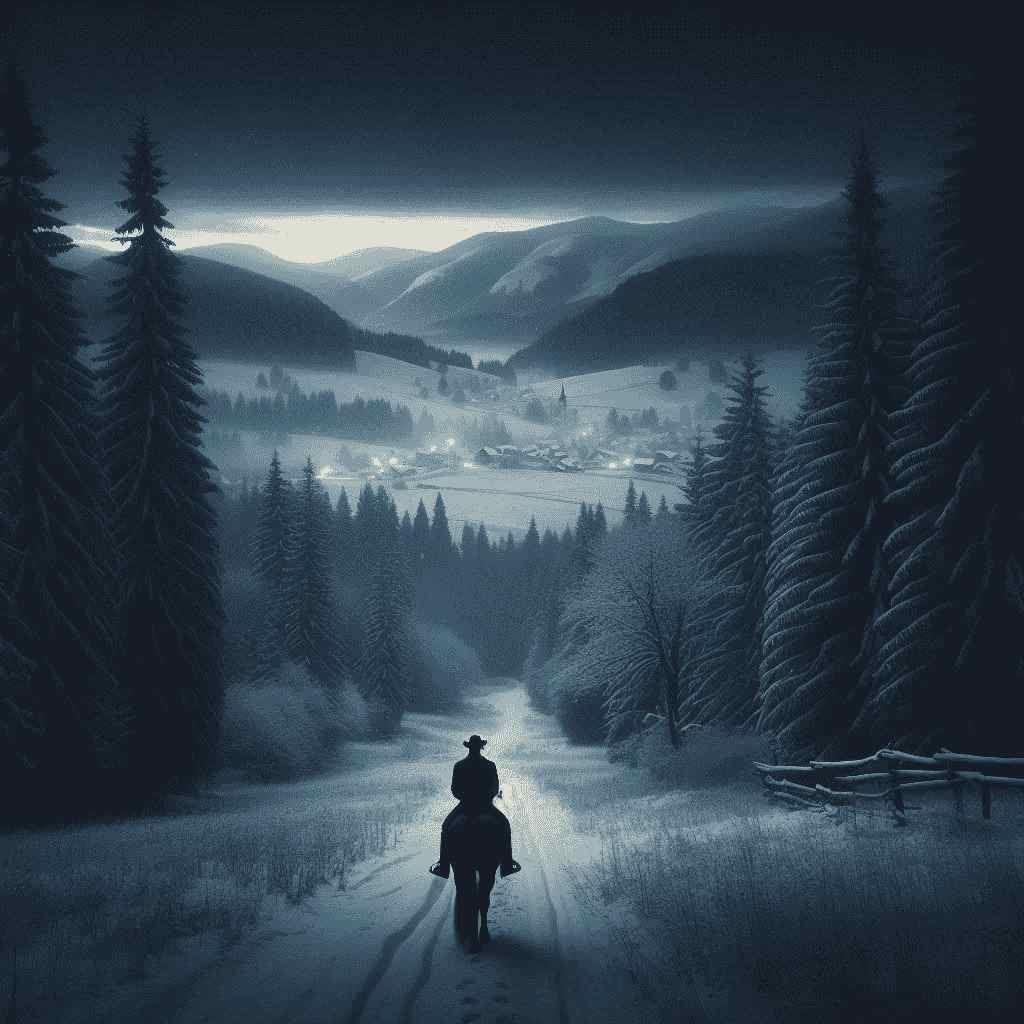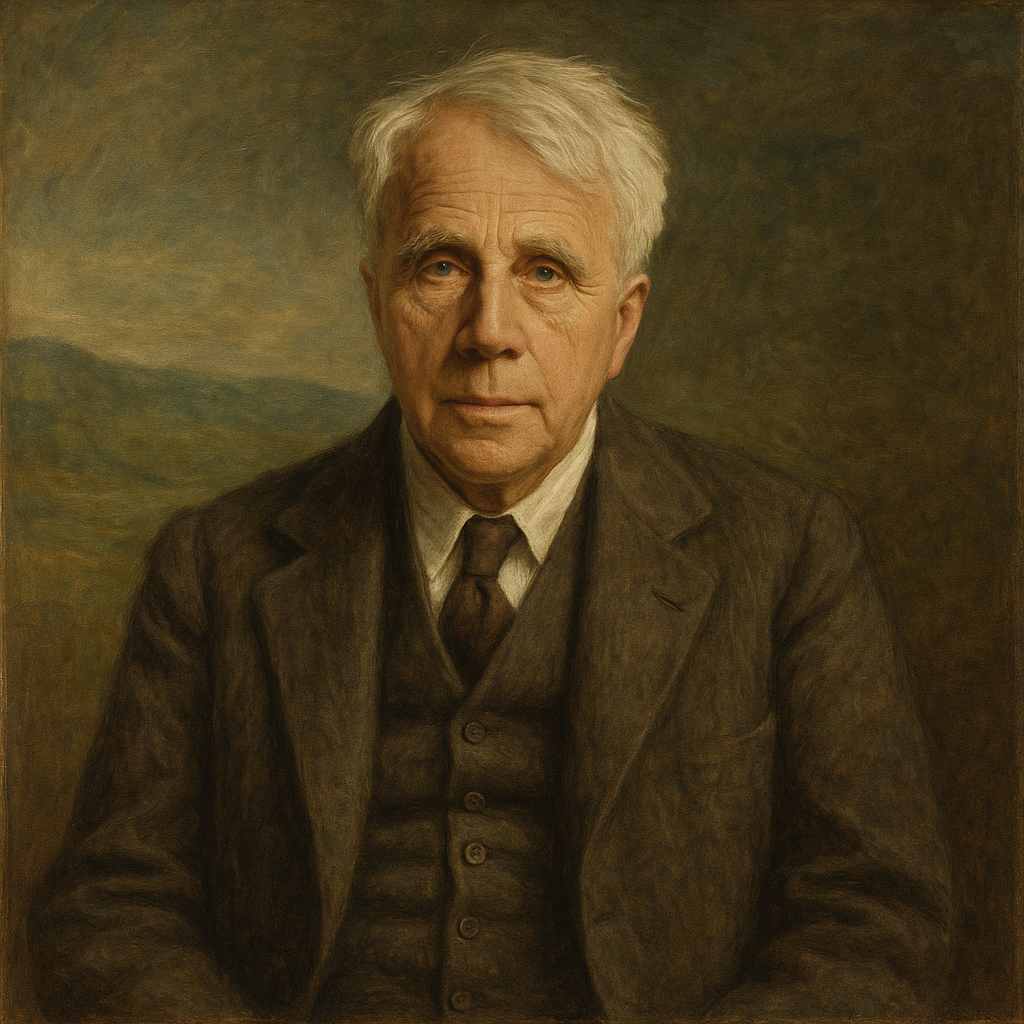Stopping by Woods on a Snowy Evening
Robert Frost
1874 to 1963

Whose woods these are I think I know.
His house is in the village though;
He will not see me stopping here
To watch his woods fill up with snow.
My little horse must think it queer
To stop without a farmhouse near
Between the woods and frozen lake
The darkest evening of the year.
He gives his harness bells a shake
To ask if there is some mistake.
The only other sound's the sweep
Of easy wind and downy flake.
The woods are lovely, dark and deep.
But I have promises to keep,
And miles to go before I sleep,
And miles to go before I sleep.
Robert Frost's Stopping by Woods on a Snowy Evening
Robert Frost's "Stopping by Woods on a Snowy Evening" is a masterpiece of American poetry that invites deep contemplation through its deceptively simple narrative and rich symbolic landscape. The poem, composed of four quatrains with a consistent AABA rhyme scheme, tells the story of a traveler pausing to observe a snow-covered woodland on a winter evening. However, beneath this surface-level description lies a complex exploration of human nature, duty, and the allure of escape.
The opening stanza immediately establishes a sense of isolation and introspection. The speaker's certainty about the woods' owner, contrasted with the owner's absence, creates an atmosphere of solitude and secrecy. This juxtaposition between the known (the village) and the unknown (the woods) sets up a central tension in the poem between civilization and wilderness, responsibility and freedom.
In the second stanza, Frost introduces the horse as a character, anthropomorphizing it to emphasize the unusual nature of their stop. The horse's bewilderment at halting "without a farmhouse near" highlights the departure from routine and expected behavior. The mention of "the darkest evening of the year" not only provides a vivid temporal setting but also imbues the scene with symbolic weight, suggesting a moment of profound existential reflection.
The third stanza further develops the sense of otherworldliness. The jingling of the horse's bells breaks the silence, serving as a reminder of the mundane world and its obligations. The "easy wind and downy flake" create a hypnotic atmosphere, lulling the speaker into a state of tranquil contemplation. This stanza exemplifies Frost's mastery of sound, with the soft sibilance of "sound's the sweep" mimicking the gentle fall of snow.
The final stanza is perhaps the most analyzed and debated part of the poem. The speaker acknowledges the beauty and allure of the woods, describing them as "lovely, dark and deep." This description carries connotations of both comfort and danger, of rest and oblivion. The repetition of "And miles to go before I sleep" in the last two lines has been interpreted in various ways: as a simple statement of the journey ahead, as a metaphor for life's ongoing responsibilities, or even as a euphemism for death.
Throughout the poem, Frost employs a conversational tone and simple language, making the complex themes accessible and relatable. This accessibility, combined with the poem's rhythmic structure and evocative imagery, contributes to its enduring popularity and impact.
On a deeper level, "Stopping by Woods on a Snowy Evening" can be read as a meditation on the human condition. The woods represent an escape from the demands of society, a place of rest and contemplation. The speaker's momentary pause to observe the woods symbolizes humanity's longing for peace and solitude in a world of constant motion and obligation. However, the ultimate decision to continue the journey reflects the inescapable nature of duty and responsibility.
The tension between desire and duty is central to the poem's thematic structure. The repetition of the final line emphasizes the weight of these obligations, suggesting both resignation and resilience. This duality is characteristic of Frost's work, which often explores the complexities of human experience through ostensibly simple narratives.
In conclusion, "Stopping by Woods on a Snowy Evening" is a nuanced exploration of the human psyche, masterfully crafted through Frost's use of imagery, sound, and structure. Its enduring appeal lies in its ability to encapsulate universal experiences and emotions within a specific, vividly rendered moment. The poem invites readers to pause and reflect on their own journeys, the promises they must keep, and the allure of the unknown that lies just beyond the familiar path.
This text was generated by AI and is for reference only. Learn more
Want to join the discussion? Reopen or create a unique username to comment. No personal details required!



Comments
No comments yet. Be the first to comment!